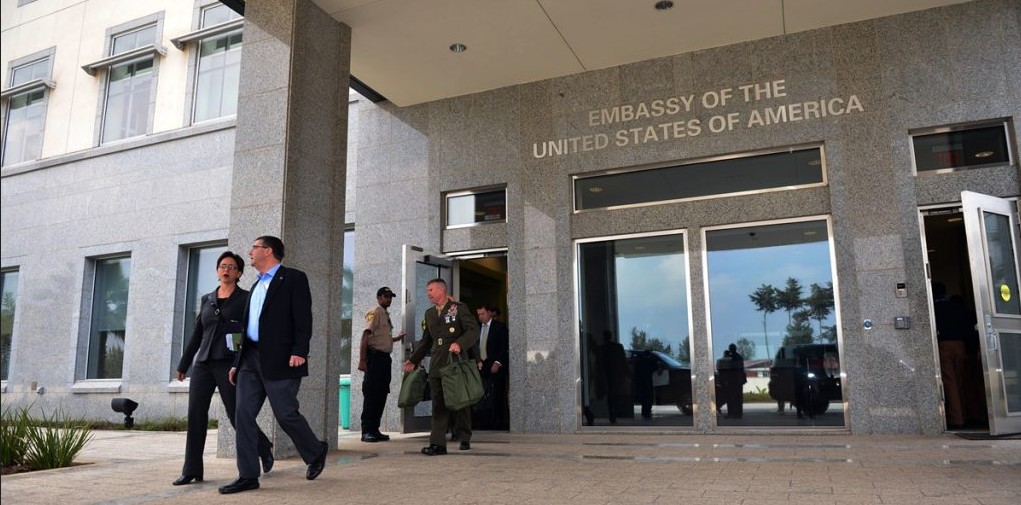Opinion: Silent edit, redacted reality: Why US embassy in Addis erased call to halt drone strikes — implications for justice

When embassies redact atrocities, when the media repeats government lines, and when international institutions turn a blind eye to ethnic cleansing, truth dies a quiet death. And with it die justice, memory, and the possibility of healing.
By Alene Yenew
In an age when truth is constantly rewritten, redacted, or repackaged for convenience, one recent act of erasure stands as a glaring symbol of moral collapse. It happened quietly—without public announcement, without accountability—but not without consequence.
More To Read
- UN urges Ethiopia and Eritrea to respect border pact amid rising tensions
- Djibouti confirms Eritrea’s formal exit from IGAD regional bloc
- Peace on paper, pain in reality: Tigray’s forgotten suffering, struggle for justice
- Ethiopia blasts Egypt for escalating hostile rhetoric and rejecting dialogue over Nile waters, GERD
- Faith under fire: How social media fuels rising attacks on religions, followers in Ethiopia
- Daua Dam, irrigation masterplan gain momentum after high-level talks in Nairobi
The US Embassy in Addis Ababa, Ethiopia, stated on May 23, 2025, following a cultural concert it hosted by the end of the week. The original version included a direct appeal to the Ethiopian government concerning its military actions. It explicitly read, “…we call for the federal government to immediately cease the use of drone strikes against its own people and facilitate resolutions.”
It was a rare moment of honesty, a flash of recognition of the violence that has claimed countless lives. But within hours, the statement was altered. The revised version read, “…we call on the federal government to continue seeking peaceful resolutions without violence and prioritise the safety and well-being of its citizens.”
The direct appeal to stop the drone strikes had been removed—erased from the public record. There was no explanation. No apology. Just a silent edit, as if the original words had never been written, as if the truth had never been spoken at all.
This may seem a minor bureaucratic act, but it is anything but. The United States—self-proclaimed champion of democracy and human rights—has known for years about the drone warfare carried out by the Ethiopian government.
It has known about the bombed homes, the marketplaces turned into blood floods, the funerals turned into massacres, and the children buried beneath rubble. It has had the intelligence, the satellite imagery, and the eyewitness accounts. And yet, as bodies piled up in Amhara, Tigray, and elsewhere, Washington chose silence. Or worse—strategic ambiguity dressed in diplomatic language.
So why, when the embassy finally broke that silence with a simple plea for restraint, did it reverse course? Why did it choose to unsay the truth?
Some will say it was a political misstep, a technical correction, or a matter of protocol. But for those watching from the ground, it was something far more devastating: a betrayal. A betrayal of the Ethiopian people, especially the Amhara, who have borne the brunt of state violence while being erased from international concern. A betrayal of the idea that truth matters. And a betrayal of what America claims to be.
The death of truth doesn’t happen all at once. It begins with edits, omissions, and euphemisms. It happens when powerful nations call war “stabilisation,” when they frame state terror as “security operations,” and when they praise peace processes that silence survivors rather than protect them. In this case, the embassy’s decision to revise the statement and delete the phrase “drone strike” was not just about language—it was about loyalty.
But this is not just an American problem. It is a global symptom of a deeper rot: the collapse of moral clarity in a world governed by convenience.
When embassies redact atrocities, when the media repeats government lines, and when international institutions turn a blind eye to ethnic cleansing, truth dies a quiet death. And with it die justice, memory, and the possibility of healing.
For the people of Ethiopia—especially those of us living in the Amhara Regional State who have been targeted, displaced, and forgotten—this silence is not neutral. It is an act of violence. Every unspoken truth, every deleted sentence, is a knife twisting deeper into an already open wound.
So we must ask: Who benefits from this erasure? Who is protected when the truth is killed? And more importantly, who will rise to remember what the world has chosen to forget?
In this age of madness, wilderness, and cruelty, we cannot afford to treat truth as disposable. We must name what is happening. We must hold accountable those who revise reality for political convenience. And we must stand with those who suffer in silence because their pain doesn’t fit into the neat narrative of diplomacy. We, the ones who are suffering, must ask Ambassador Ervin Massinga.
***
Editor’s Note: Based in Bahir Dar city, Alene Yenew is an independent consultant specialising in global monitoring, evaluation, accountability, and learning (MEAL) systems, as well as data monitoring. He is also the author of the book Outcry in the Age of Madness—Ethiopia’s Lament for the Soul of a Dying World.
Top Stories Today











































